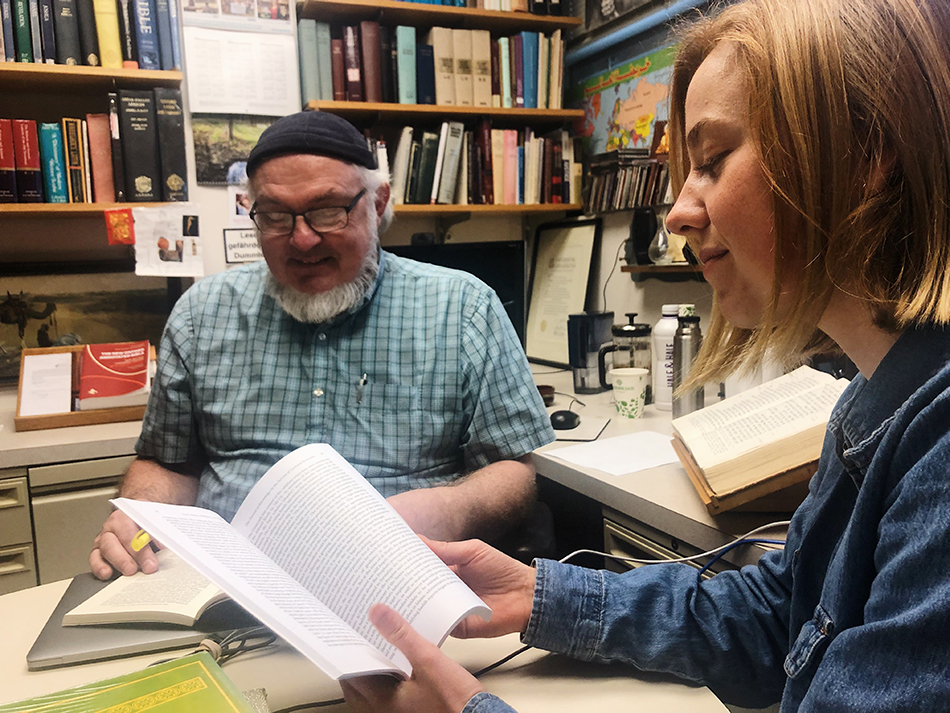Bible and religion professor Paul Keim lives in language.
He has since seventh grade, when he began learning German, opening the door to nearly 15 languages that Keim now humbly considers himself literate in – German, French, Spanish, Arabic, Greek, Latin, Polish, Hebrew, Akkadian, Ugaritic, Aramaic, Ge’ez…His journey with languages, those both dead and alive, is shaped by the relationships he’s made with others while studying language together, a realization that became clear to Keim during his time as a Goshen College student.
Now in his last teaching semester at Goshen College, Keim continues to pass the gift of language on to the final few students – or any student who asks, he said.
To Keim, leading independent language studies doesn’t seem like a big deal, but his students tell a different story.
“Paul has a contagious excitement for the languages he studies,” sophomore Elizabeth Reimer said. “Listening to him talk, it’s impossible not to get just as excited. He shows you the beauty of the language in a way that is hard to articulate.”
Senior Sophia Martin has wanted to study language with Keim for a long time, but hadn’t found the time until now, in her final semester at GC, where she anticipates studying Latin and German under Keim’s direction.
“He’s just so brilliant,” Martin said. “But he understands how to make his knowledge accessible to other people.”
Keim’s office on campus is wallpapered in books of all languages.
Sit down with him to discuss language, and he can’t seem to sit still, reaching to grab the next book that relates to the conversation, whether that be C.S. Lewis’s Studies in Words or Katherine Rich’s Dreaming in Hindi. English translated texts optional.
“Language learning is not highly valued in our culture,” Keim said. “And so when you run into students who really do value it, then you want to respond to that and facilitate it as much as possible.”
It’s a gift that Paul Keim received from his Bible professor, Dennis MacDonald, while a student at Goshen College, meeting with several undergraduate and seminary students on a Friday afternoon at 4 p.m. to read and discuss texts in Latin and Greek.
“It was such a great experience that I decided in future, if any student asked me to do language study, unless impossible, I would do it,” Keim said.
Keim calls these independent language studies “pure, labors of love” as neither he nor the student is receiving credit or pay for the time put into studying and discussing all aspects of language – the grammar, the history, the culture. In fact, Keim will tell you he has taken on roles as the “fake German teacher” or “fake Arabic teacher” at GC when asked.
“You don’t have to learn language in order to be curious about culture and to learn a lot about other societies,” Keim said. “But there’s no real substitute for it because it really gets down to the nitty gritty.”
When Elizabeth Reimer, a Bible and religion major, first arrived at Goshen College, she desired to study a dead language in whatever way she could.
Keim was the perfect match.
“For the most part, I feel safe teaching dead languages because no native speakers can challenge your interpretation.”
Among those languages considered dead, defined as a language that is no longer native to any community, are Latin and Ancient Greek. Keim learned both, deepening his knowledge of all things biblical.
“After we decided that I would study some language with Paul Keim, Paul asked me if I had a preference between Hebrew and Greek,” Reimer said. “When I told him that he could choose, he said that he hadn’t done Hebrew in a while, and that’s how we ended up studying Hebrew.”
Though Keim feels at home learning language, he admits, it isn’t easy.
“It’s a painstaking process, and it often feels impossible,” he said. “But if you persist, it turns out it is possible.”
Past language students of Keim’s, such as Peter Hartman (‘03), have gone on to conduct graduate-level work in languages Keim first began teaching them during their time at Goshen College.
“It’s mostly anecdotal, just passing on what I’ve experienced and learned,” Keim said.
In his 23 years at Goshen College, Keim estimates he has guided nearly 20 students in language study, all outside of his title as professor of Bible and religion, but deeply connected to who Keim is as a person: a lifelong language learner.
“We should know about other people, and not just language, but culture, religion, all that stuff,” Keim said. “If we want to interact with the world, trade with the world, understand the world, make peace in the world, we should make an effort to experience what it’s like to cross the boundary and be vulnerable in that way.”




